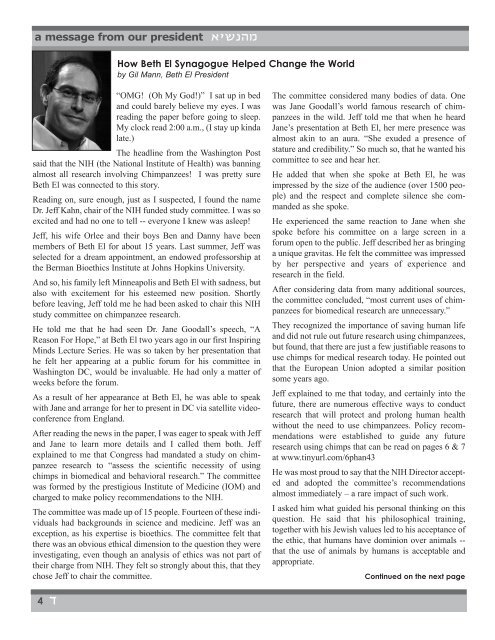February 2012 - Beth El Synagogue
February 2012 - Beth El Synagogue
February 2012 - Beth El Synagogue
Create successful ePaper yourself
Turn your PDF publications into a flip-book with our unique Google optimized e-Paper software.
a message from our president `iypdn<br />
How <strong>Beth</strong> <strong>El</strong> <strong>Synagogue</strong> Helped Change the World<br />
by Gil Mann, <strong>Beth</strong> <strong>El</strong> President<br />
“OMG! (Oh My God!)” I sat up in bed<br />
and could barely believe my eyes. I was<br />
reading the paper before going to sleep.<br />
My clock read 2:00 a.m., (I stay up kinda<br />
late.)<br />
The headline from the Washington Post<br />
said that the NIH (the National Institute of Health) was banning<br />
almost all research involving Chimpanzees! I was pretty sure<br />
<strong>Beth</strong> <strong>El</strong> was connected to this story.<br />
Reading on, sure enough, just as I suspected, I found the name<br />
Dr. Jeff Kahn, chair of the NIH funded study committee. I was so<br />
excited and had no one to tell -- everyone I knew was asleep!<br />
Jeff, his wife Orlee and their boys Ben and Danny have been<br />
members of <strong>Beth</strong> <strong>El</strong> for about 15 years. Last summer, Jeff was<br />
selected for a dream appointment, an endowed professorship at<br />
the Berman Bioethics Institute at Johns Hopkins University.<br />
And so, his family left Minneapolis and <strong>Beth</strong> <strong>El</strong> with sadness, but<br />
also with excitement for his esteemed new position. Shortly<br />
before leaving, Jeff told me he had been asked to chair this NIH<br />
study committee on chimpanzee research.<br />
He told me that he had seen Dr. Jane Goodall’s speech, “A<br />
Reason For Hope,” at <strong>Beth</strong> <strong>El</strong> two years ago in our first Inspiring<br />
Minds Lecture Series. He was so taken by her presentation that<br />
he felt her appearing at a public forum for his committee in<br />
Washington DC, would be invaluable. He had only a matter of<br />
weeks before the forum.<br />
As a result of her appearance at <strong>Beth</strong> <strong>El</strong>, he was able to speak<br />
with Jane and arrange for her to present in DC via satellite videoconference<br />
from England.<br />
After reading the news in the paper, I was eager to speak with Jeff<br />
and Jane to learn more details and I called them both. Jeff<br />
explained to me that Congress had mandated a study on chimpanzee<br />
research to “assess the scientific necessity of using<br />
chimps in biomedical and behavioral research.” The committee<br />
was formed by the prestigious Institute of Medicine (IOM) and<br />
charged to make policy recommendations to the NIH.<br />
The committee was made up of 15 people. Fourteen of these individuals<br />
had backgrounds in science and medicine. Jeff was an<br />
exception, as his expertise is bioethics. The committee felt that<br />
there was an obvious ethical dimension to the question they were<br />
investigating, even though an analysis of ethics was not part of<br />
their charge from NIH. They felt so strongly about this, that they<br />
chose Jeff to chair the committee.<br />
The committee considered many bodies of data. One<br />
was Jane Goodall’s world famous research of chimpanzees<br />
in the wild. Jeff told me that when he heard<br />
Jane’s presentation at <strong>Beth</strong> <strong>El</strong>, her mere presence was<br />
almost akin to an aura. “She exuded a presence of<br />
stature and credibility.” So much so, that he wanted his<br />
committee to see and hear her.<br />
He added that when she spoke at <strong>Beth</strong> <strong>El</strong>, he was<br />
impressed by the size of the audience (over 1500 people)<br />
and the respect and complete silence she commanded<br />
as she spoke.<br />
He experienced the same reaction to Jane when she<br />
spoke before his committee on a large screen in a<br />
forum open to the public. Jeff described her as bringing<br />
a unique gravitas. He felt the committee was impressed<br />
by her perspective and years of experience and<br />
research in the field.<br />
After considering data from many additional sources,<br />
the committee concluded, “most current uses of chimpanzees<br />
for biomedical research are unnecessary.”<br />
They recognized the importance of saving human life<br />
and did not rule out future research using chimpanzees,<br />
but found, that there are just a few justifiable reasons to<br />
use chimps for medical research today. He pointed out<br />
that the European Union adopted a similar position<br />
some years ago.<br />
Jeff explained to me that today, and certainly into the<br />
future, there are numerous effective ways to conduct<br />
research that will protect and prolong human health<br />
without the need to use chimpanzees. Policy recommendations<br />
were established to guide any future<br />
research using chimps that can be read on pages 6 & 7<br />
at www.tinyurl.com/6phan43<br />
He was most proud to say that the NIH Director accepted<br />
and adopted the committee’s recommendations<br />
almost immediately – a rare impact of such work.<br />
I asked him what guided his personal thinking on this<br />
question. He said that his philosophical training,<br />
together with his Jewish values led to his acceptance of<br />
the ethic, that humans have dominion over animals --<br />
that the use of animals by humans is acceptable and<br />
appropriate.<br />
Continued on the next page<br />
4 c

















